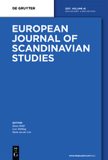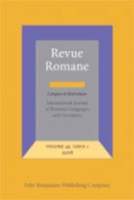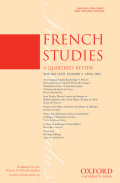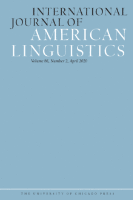
Ezhegodnik Finno-Ugorskikh Issledovanii-Yearbook of Finno-Ugric Studies
metrics 2024
Unlocking the Secrets of Finno-Ugric Cultures
Introduction
Ezhegodnik Finno-Ugorskikh Issledovanii-Yearbook of Finno-Ugric Studies is a distinguished academic journal published by Udmurt State University, focusing on the vibrant field of Finno-Ugric studies. With its ISSN 2224-9443 and E-ISSN 2311-0333, this journal serves as a vital platform for researchers, scholars, and students to contribute and access high-quality, peer-reviewed work that explores the linguistic, cultural, and historical dimensions of Finno-Ugric peoples. This journal is particularly essential for those interested in interdisciplinary studies, as it often intersects with anthropology, linguistics, and cultural studies. Although currently not available as open access, it provides valuable insights for advancing academic discourse in this underrepresented area of study. The Yearbook is located in Izhevsk, Russia, and is committed to enriching the academic community, fostering collaboration, and promoting understanding of the Finno-Ugric heritage.
Metrics 2024
 -
- 0.10
0.10 0.10
0.10 -
-Metrics History
Rank 2024
JCI (Web Of Science)
Quartile History
Similar Journals

BULLETIN HISPANIQUE
Fostering Dialogue Across Literature, Language, and HistoryBULLETIN HISPANIQUE, published by PRESSES UNIV BORDEAUX, is a prominent academic journal dedicated to the interdisciplinary exploration of literature, linguistic studies, and historical analysis related to the Spanish-speaking world. Since its inception in 1972, the journal has established itself as a vital resource for researchers and scholars, achieving notable recognition across various categories—most recently characterized as Q2 in History, Q3 in Linguistics and Language, and Q1 in Literature and Literary Theory for the year 2023. Though it operates under traditional access models, BULLETIN HISPANIQUE maintains a commitment to scholarly excellence, offering insightful articles that contribute to the rich tapestry of cultural and linguistic discourse. With its Scopus rankings reflecting significant academic engagement, the journal serves as an essential platform for dialogue and discovery in the arts and humanities, appealing to a diverse audience of students, professionals, and academics committed to advancing knowledge in these vital fields.

European Journal of Scandinavian Studies
Advancing the frontiers of Scandinavian scholarship.European Journal of Scandinavian Studies is an esteemed journal published by Walter de Gruyter GmbH, dedicated to advancing scholarship in the fields of Cultural Studies, Linguistics and Language, and Literature and Literary Theory. Since its inception in 2010, the journal has been a pivotal platform for researchers and scholars, showcasing cutting-edge research and critical discussions pertaining to Scandinavian languages and cultures. With an ISSN of 2191-9399 and an E-ISSN of 2191-9402, the journal emphasizes accessibility to impactful academic work, despite its current non-open access model. While the journal is categorized within the Q4 quartile for Cultural Studies and Linguistics/Language, it has shown notable potential in ranking higher in its specialized domains, fostering a growing community of researchers invested in Scandinavian studies. The journal's office is located in Berlin, Germany, further enriching its European scholarly context. As it continues to evolve, the European Journal of Scandinavian Studies serves as a vital resource for academics seeking to engage deeply with the multifaceted aspects of Scandinavian culture and linguistics.

Tomskii Zhurnal Lingvisticheskikh i Antropologicheskikh Issledovanii-Tomsk Journal of Linguistics and Anthropology
Advancing Interdisciplinary Insights in Linguistics and AnthropologyTomskii Zhurnal Lingvisticheskikh i Antropologicheskikh Issledovanii (Tomsk Journal of Linguistics and Anthropology), published by TOMSK STATE PEDAGOGICAL UNIVERSITY, is a prominent open-access journal dedicated to advancing the fields of linguistics and anthropology. With a keen focus on interdisciplinary research, this journal provides a platform for scholars, researchers, and students to publish cutting-edge studies that explore the intricate ties between language and culture. Although specific impact factors and rankings are currently unavailable, the journal's commitment to fostering dialogue and innovation in the social sciences positions it as an essential resource for professionals seeking to broaden their understanding of human communication and social behaviors. Encompassing a wide array of topics from sociolinguistics to ethnographic studies, the Tomskii Zhurnal invites contributions that challenge conventional paradigms and contribute to the richness of linguistic and anthropological scholarship.

SCHWEIZERISCHES ARCHIV FUR VOLKSKUNDE
Enriching Academic Discourse on Folk CultureSCHWEIZERISCHES ARCHIV FUR VOLKSKUNDE, with ISSN 0036-794X, is a vital resource for scholars and practitioners in the fields of Arts and Humanities and Cultural Studies. Published by G KREBS VERLAGSBUCHHANDLUNG AG in Switzerland, this journal plays a crucial role in advancing the discourse surrounding folk culture, traditions, and anthropology. Despite its current ranking in the Q4 category for both Arts and Humanities and Cultural Studies, the journal serves as an essential platform for disseminating unique research findings and insights, contributing to a well-rounded understanding of diverse cultural practices. Researchers, professionals, and students are encouraged to explore the rich content produced between 2008 and 2014, and from 2017 to 2023, which reflects a commitment to fostering a multidisciplinary approach to folklore studies. By addressing the complexities of cultural dynamics, the journal not only promotes scholarly engagement but also enriches the academic community’s appreciation of folk traditions.

REVUE ROMANE
Pioneering Research at the Intersection of Language and LiteratureREVUE ROMANE is a prestigious academic journal published by John Benjamins Publishing Co, located in the Netherlands. With a rich heritage dating from 1996 to 2024, this esteemed journal focuses on the dynamic interplay of *Linguistics* and *Literature*, making it an essential resource for scholars, researchers, and students alike. By showcasing a range of theoretical and empirical studies, the journal has positioned itself in the Q3 and Q2 quartiles for *Linguistics and Language* and *Literature and Literary Theory* respectively, reflecting its significant impact on these fields. With impressive Scopus rankings, including a notable 79th percentile in Arts and Humanities within Literature and Literary Theory, REVUE ROMANE serves as a critical platform for the exploration of both language and literary expressions, encouraging dialogues that bridge cultural and linguistic divides. Although it is not open access, its contributions are invaluable for advancing knowledge and fostering scholarly discourse in the realms of linguistic and literary investigation.

Caplletra
Advancing Open Access Scholarship in LinguisticsCaplletra is a distinguished open-access journal dedicated to the field of linguistics and language studies, published by PUBL ABADIA MONTSERRAT since its inception. Based in Barcelona, Spain, this journal has been a vital resource for researchers, professionals, and students engaged in the intricate explorations of language and its applications since its transition to open access in 2005. Despite its current quartile ranking of Q4 within the Linguistics and Language category as of 2023, Caplletra continues to serve as an inclusive platform, fostering a dialogue that encourages a diverse range of scholarly contributions. Covering an expansive scope in the converged years from 2018 to 2024, it plays a crucial role in disseminating innovative research and insights. With its ISSN 0214-8188 and E-ISSN 2386-7159, Caplletra is committed to making academic work accessible to all, enhancing the landscape of linguistic scholarship and reflecting the evolving nature of language studies.

FRENCH STUDIES
Bridging Cultures Through Scholarly ExcellenceFRENCH STUDIES is a premier academic journal published by Oxford University Press, dedicated to advancing the fields of Cultural Studies, History, Linguistics, and Literature. Established in 1947, the journal has become a significant platform for interdisciplinary research, reflecting on the complexity and richness of French cultural and literary heritage. With an impact factor that positions it in Quartiles Q2 and Q3 across various categories, including Literature and Literary Theory, FRENCH STUDIES is recognized for its scholarly contributions and insights into historical narratives, linguistic developments, and cultural analyses. The journal does not currently offer open access options, yet it remains an essential resource for researchers, professionals, and students seeking to deepen their understanding of French studies and its global implications. The journal's commitment to quality and intellectual rigor is evidenced through its Scopus rankings, making it a valuable asset for the academic community in the United Kingdom and beyond.

INTERNATIONAL JOURNAL OF AMERICAN LINGUISTICS
Pioneering Research in the Dynamics of Language.The INTERNATIONAL JOURNAL OF AMERICAN LINGUISTICS, published by University of Chicago Press, is a revered scholarly publication dedicated to the exploration and advancement of linguistic studies, particularly those related to the American linguistic landscape. With an ISSN of 0020-7071 and an E-ISSN of 1545-7001, this journal serves as a vital platform for researchers, professionals, and students interested in the nuances of language, dialects, and linguistic structures through rigorous academic inquiry. The journal has established a commendable impact, reflected in its ranking within the Q2 category in Linguistics and Language and its placements in the Scopus rankings, thereby positioning itself within the 50th to 53rd percentile of its respective fields. While the journal does not provide Open Access options, it continues to be a cornerstone resource for those seeking to expand their understanding of American linguistics, already converging from 1996 to 2024. Through its continued commitment to excellence, this publication remains essential for those aiming to contribute significantly to the field.

Bilig
Advancing interdisciplinary dialogue in Arts and Humanities.Bilig, published by Ahmet Yesevi University in Turkey, is a distinguished open-access journal that has made significant strides in the Arts and Humanities as well as Social Sciences fields since its inception in 2008. The journal, identifiable by ISSN 1301-0549, holds an impact factor that reflects its commitment to scholarly excellence, currently ranking in the Q3 quartile for Arts and Humanities and Q4 for Social Sciences, as of 2023. With its wide-ranging scope, Bilig aims to facilitate interdisciplinary dialogue and innovative research by providing a platform for novel contributions that foster understanding of various cultural and social dynamics. The journal's presence in Scopus lends it further credibility, as it ranks among the top journals in its categories, making it a valuable resource for researchers, professionals, and students alike. As Bilig continues to evolve through 2024, it is poised to further its contribution to academic scholarship and is essential reading for anyone involved in these vibrant fields.

Palaeohispanica-Revista sobre Lenguas y Culturas de la Hispania Antigua
Unveiling the Rich Heritage of Iberian CulturesPalaeohispanica-Revista sobre Lenguas y Culturas de la Hispania Antigua is a distinguished academic journal dedicated to the study of ancient Spanish languages and cultures. Published by the INST FERNANDO CATOLICO in Spain, this journal serves as an essential platform for scholars and researchers exploring the rich historical and linguistic heritage of Iberia. With a specific focus on the intersections of archaeology, history, linguistics, and cultural studies, Palaeohispanica has garnered substantial recognition, reflecting its commitment to high-quality research as evidenced by its rankings in prominent Scopus categories, reaching the 80th percentile in History and the 69th in Archaeology. While the journal operates without an Open Access option, it continues to contribute significantly to the academic discourse surrounding ancient Hispania from 2019 to 2023, ensuring that vital research is accessible to a discerning audience. As a Q3 and Q2 ranked publication in various relevant categories, it is an invaluable resource for professionals, researchers, and students eager to delve into the complexities of ancient languages and cultures.